Peter MALONE
Saturday, 18 September 2021 19:27
Meet Me After the Show
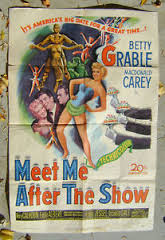
MEET ME AFTER THE SHOW
US, 1951, 88 minutes, Colour.
Betty Grable, Macdonald Carey, Rory Calhoun, Eddie Albert.
Directed by Richard Sale.
Meet Me After The Show is a pleasant Betty Grable vehicle. Popular during the war and in the years afterwards, she made many enjoyable musicals at 20th. Century Fox. Here she is teamed with Macdonald Carey, Rory Calhoun at the beginning of his career appears as the usual tall handsome stranger, Eddie Albert supplies some comedy. There are many Betty Grable songs and dances. She also has the opportunity for some satire in being a star with sleazy origins in Florida and she pretends amnesia and goes back to these after her success. The writing is by Mary Loos and Richard Sale who was responsible for such entertaining musicals as Two Tickets To Tomahawk with Dan Dailey and Anne Baxter. Songs are by Jule Styne and Leo Robin. Inconsequential but with the perennial themes of the theatre, success, jealousies, marriage. An example of the 20th. Century Fox musicals of the '50s.
Published in Movie Reviews
Published in
Movie Reviews
Tagged under
Saturday, 18 September 2021 19:27
Meetings With Remarkable Men
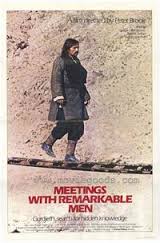
MEETINGS WITH REMARKABLE MEN
UK, 1979, 120 minutes, Colour.
Gregoire Aslan, Martin Benson, Colin Blakely, Terence Stamp, Roger Lloyd Pack, Marius Goring, Athol Fugard, Warren Mitchell.
Directed by Peter Brook.
N. Gurdjieff has made some impact as a searcher for the meaning of life. Peter Brook's adaptation of Gurdjieff's partly autobiographical book invites audiences to get to know him and appreciate the style and significance of his search. Beautifully filmed in Afghanistan (the photography is a constant and striking pleasure), the film has an impressive opening with the adolescent Gurdjieff. As he moves on his search in Persia, Egypt and the Gobi Desert and Tibet, it becomes more solemn (at times portentous in its utterances) and exotic, especially in its presentation of a universal brotherhood and its asceticism and song and dance movement. A beautiful, reflective (even if not entirely persuasive) experience.
1. The impact of the film? As a film, as a portrait of Gurdjieff, as a film about the philosophy of life, the experience of truth and religion? The philosophical and religious viewpoints? How were these communicated cinematically? A good example of the visual and aural communication of philosophy and the search for truth?
2. The personality of Gurdjeff: his reputation, his books, his work in France, the significance of his background, the nature of his search? What did he discover? What did he have to offer 20th century people? The filmed version of his book - its episodic nature, the cumulative effect of the episodes? The proportion of the episodes? The film as part biography, part study?
3. The technical qualities of the film? Peter Brook and his cinema and stage background? An intellectual investigating the truth and trying to find cinematic images to communicate the search? The quality of the colour photography, the Afghanistan opening, the use of Afghanistan locations? The mountains, desert, towns? How well did the film create the atmosphere of Russia, of the East? The significance of the musical score? Background? Music used in Gurdjieff's search? The quality of the editing and pace - the length of the shots of people, landscapes? The audience being immersed in the landscapes and the events? The close scrutiny of the characters at length? The effect of making the audience work at its response to being confronted with the images?
4. The film's re-creation of the early 20th. century? The vast extent of Russia? The Caucuses and the people who lived there? A blend of East and West? European heritage, eastern location and atmosphere? The contribution to Gurdjieff's upbringing? His journeys, Egypt, the Gobi Desert. Tibet? The partly primitive background from which he came, the emergence of machines, education in the 20th. century? Gurdjieff seen as a man bridging cultures, bridging times, representing the developments of the century?
5. What does the film have to offer on Gurdjieff: his character and personality, the explanation of his background and its visualising, the significance and nature of his search, the quality of his experience, the source for his questions and answers? The remarkable men that he encountered? Audience curiosity about him, search for information? The possibilities of following his ways? Discipleship? Gurdjieff as a symbol of 20th century human search for the meaning of life, the meaning of human nature?
6. The impact of the opening episode: the long credit sequence, the mountains and their beauty, desert mountains? Land and sky? The gathering of the local people? The competition for the music and sound and echo? The focus on the faces of the crowd? Their gathering, their respectful listening, their respect for the judges? The contestants and their making music? The wonder of the winner? Young Gurdjieff and his fascination and wonder? His father's presence and comments? The change of pace in the school sequences, the home sequences? Young Gurdjieff's friends, fights, the attraction towards the girl in the town square? Jealousies? The duel? The young students going to the cannon field? The risk of death? The injury of the other partner? The e effect on Gurdjieff and his wonder about death? His father's work, wisdom ? comments on life and the soul? These sequences as a tribute to Gurdjieff's father?
7. The transition to the adult Gurdjieff? His work in the railways? The group to which he belonged, the varying personalities? The woman in the group? Their search? The manuscripts ? and their painting the bird and selling him to gain the money? The searching for news of the brotherhood? Their disappointment in the texts?
8. The young monk and his befriending Gurdjieff? His discussions about relig~ ion and being unworthy? Gurdjieff's reflections on religion, priesthood? Their orthodox upbringing? Sharing their friendship? Their search for the maps, manuscripts? Their going to Egypt ? and the former monk deciding not to go on with the search but to continue his study of machines?
9. The visit to the monk in the monastery, his map and the story of the prince tracing it and giving money, GurdjieffIs? tracing the map?
10. The visit to Egypt, the fascination with the land? The wise men? The encounter with the archeologist? The meeting with the prince and discovering him to be the man with the map? The prince and the story of his search for truth? His guiding Gurdjieff to the various masters? The sequences of the visits to the dervishes? The discussions about exercises, breathing, prayer and reflection? The style of the masters and their disciples? The eastern manner of discipleship?
11. Terence Stamp's character portrayal of the prince? A man of melancholy, search and dignity? The possibilities of his life? His sense of failure? His continued search, friendship with Gurdjieff? The opportunity for peace and his accepting it?
12. The wide range of wise men in Egypt and their influence on Gurdjieff? Their not satisfying him?
13. The build-up to the expedition to the Gobi Desert? The archeologist and his influence? Gurdjieff's decision to go, his gathering his group tog~ ether? The joy of their meeting one another again? The zest for the common search? The preparations for the journey through the desert, the difficulties, the winds ? and the use of the stilts to breathe? The camels? The end of the expedition and the sense of failure? The group going back? The archeologist going on with Gurdjieff?
14. The significance of the remote monastery, the Italian friar and his wisdom? His explanations of search to Gurdjieff? The brotherhood? The community in which he lived, the good that he did? The archeologist finding his place there?
15. Gurdjieff's long journey to Tibet, the difficulties of the journey, endurance and hardships? The arrival at the monastery? The remoteness of the monastery, its search for the truth? The head of the monastery and his insight into Gurdjieff's character? The discovery of the prince and the renewal of friendship, the tour of the monastery and the long presentation of singing, dancing, movements? The invitation to Gurdjieff to discover what was most helpful to himself?
16. The long presentation of the exercises, dances and music of the monastery? The significance of the movements? The possibility of self-discovery by going inside oneself through the help of these mans? The exotic style? Colourful? The choreography, the discipline and training?
17. The atmosphere of the East and its traditions for self-knowledge? Their relevance for 20th century people? Gurdjieff and the eclectic nature of his search? The significance of the title of the film and Gurdjieff's memoirs of his experience? The significance of Gurdjieff's questions, the significance of his answers, teaching?
Published in Movie Reviews
Published in
Movie Reviews
Tagged under
Saturday, 18 September 2021 19:27
Medea/ 1970
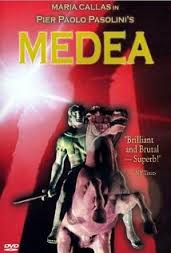
MEDEA
Italy, 1970, 110 minutes, Colour.
Maria Callas, Laurent Terzieff.
Directed by Pier Paolo Pasolini.
Medea is Pasolini's second adaptation of a Greek classic. The former film was Edipo Re with Franco Citti. This time he directs opera star Maria Callas in Euripides' play. She looks the part and gives a powerful performance as the barbarian princess who enters the civilised world of the Greeks only to be lost and driven towards murder and self-destruction. One of the best aspects of the film is the photography of the sets, the eerie lunar-like landscapes of Scythia and the contrast of the beauty of the Greek world. The ending is rather too swiftly paced for assimilation, but the film is a most impressive visual presentation of a classic.
1. Did the film presuppose a knowledge of Greek myths or could it be easily followed as it was presented?
2. What is the perpetual fascination of the legend and personality of Medea?
3. Comment on the point and the effectiveness of the centaur and Ids prologue and role in the film, his change from myth (half beast, half man) to reality (to man). Was this a change in religious? rational perspective?
4. What was the significance of the centaur landscape? its tranquil beauty, so Grecian?
5. What was the significance of the centaur's advice to Jason? Why was he encouraged as one specially chosen?
6. Comment on the contrast of the Scythian landscape with the Grecian - the visual stark beauty, the atmosphere of barbarity. How necessary for the theme of the film and Medea's change was this visual contrast for the audience?
7. Anthropologists have commented on the effectiveness of the presentation of Scythia, the landscape, costumes, people's manners, human sacrifice (ritual solemnity as well as an absolute faith in them to the eating of the victim, sharing), the significance of the victim, blood and the way the victim was killed. How strong were the overtones of Christianity here? Is this important for the film?
8. What was the role of Medea as a princess in this civilisation? The building up of Medea's brother, then the contrast of the urbane, Grecian Jason and Medea and her background.
9. What was the significance of the Golden Fleece ? for Medea, for Jason (as a goal of achievement) ?
10. What motivated Jason ? taking over the kingdom, the going on with the expedition, the adventure?
11. What motivated Medea in helping Jason ? her solemn going to the temple, her brother helping her? The escape, the vengeance of the pursuit. Comment on the legendary cutting up of the brother to thwart pursuit. Was this well prepared for?
12. How significant was the voyage for Medea, her arrival and the effect of the Grecian landscape on her?
13. At this point the centaur returns and comments. The film made much of myth and reality. How much myth does mankind need? It seems to be suggested that as a man grows older, he needs less myth - does the world seem more real or does the myth become the world? What was the point of the centaur's disquisition on inner and outer reality ? the two were one, inside Jason. Had the Greeks lost the myths and relied solely on their rational selves, contrasting with Medea, who lived myths, now in this Greek environment?
14. The significance of Medea's arrival - her run across the landscape, her elemental unity with the earth and the sun, water?
15. Medea consummates her love for Jason in this environment. How important was this for her? was it important for him, or was it merely a form of lust?
16. Why did the film make a jump of ten years? Did this harm the pace of the film in any way?
17. The second part opened with Medea's alienation, the effect of ten years Greek association, the lessening of her potential, of her nature; her estrangement from Jason, yet her love of her children.
18. Comment on this third landscape: the city (Pisa's buildings were used), the cliff, the sea, Medea and the sea.
19. What has happened to Jason in Greece, in power ? his seeming emasculation, his playing with the children?
20. What role did the King play in the film? (Why had he not abdicated?) His influence on Jason, attitude to Medea? The princess?
21. What was the effect of the repetition in the screenplay ? the gift and the deaths how much reality, how much fantasy, how much of Medea's mind and feelings?
22. The significance of Medea's drawing strength from the sun, its divine inspiration, her changing back to her former self and its affect on Jason?
23. Why was the princess so trusting?
24. The significance of the banishment on Medea? on Jason - and his consummation of his love for the Princess?
25. How do you explain Medea's killing of her children?
26. The rapid ending? The final crisis? What had been achieved? Its effect on the audience?
27. Greek drama aimed at catharsis of emotions. Is this relevant to this film version of Euripides? Why did Pasolini! make this film? What effect on audiences did he want?
Published in Movie Reviews
Published in
Movie Reviews
Tagged under
Saturday, 18 September 2021 19:27
Mechanic, The
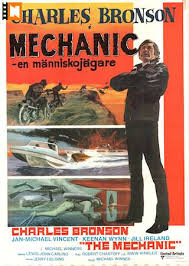
THE MECHANIC
US, 1972, 100 minutes, Colour.
Charles Bronson, Jan- Michael Vincent, Keenan Wynn, Jill Ireland, Linda Ridgeway.
Directed by Michael Winner.
The 1969 film "Hard Contract" asked, "What do the beautiful people do when they've done everything?" The answer was that they hired themselves out to kill. This film gives an extreme close-up of a professional hit-man, employed by syndicate bosses to eliminate unnecessary people expertly. Charles Bronson shows as a psychotic who mixes calm and thorough study of victims and technical method with potentially neurotic loneliness and breakdown. There is violence and some spectacularly contrived chases for the entertainment seeker, but there is a macabre and ironic flavour about the film which persuades us that this seemingly glamorous amoral life ends nowhere.
1. Was this an interesting thriller? What were its best features? Was it not only exciting, but interesting? Raising discussion questions?
2. The character of Arthur Bishop? Did the film make him attractive? Did the film show insight into his character? What kind of person was be? why was he a mechanic? How insane was he, psychotic? or was he merely a lonely individual doing a callous job? The symbolism of his physical illness and his hospitalisation?
3. Can you understand why people become professional killers? What is it in their makeup that enables them to do this cruel work? Have they consciences? Did this film help you to understand the mind of such a professional killer?
4. Comment on the filming of Bishop's elaborate tracking and understanding of his victim? How interesting was the filming of Harry? Why?
5. What were your impressions after his first actual killing, execution? Did this alter your attitude towards him?
6. Comment on his home, its beauty. its luxury. but the fact that he was quite alone?
7. The importance of his visit to the prostitute and his acting and her acting? Was he able to relate to anyone as a human being?
8. His visit to Harry Mc Kenna ? its seeming to show a human side to him, old times, Harry Mc Kenna and his relationship to his son, Harry McKenna? as a crook?
9. The way that Mc Kenna's death was filmed? The cruelty. the torture, the fear for Mc Kenna, the realisation that he was killed by a friend, but the fact that the murder could not be traced? Again the impact on the audience of this?
10. What were you first impressions of Steve McKenna? Was he an attractive character? Was he a parallel to Arthur Bishop twenty years earlier? Why was he so callous at his father's funeral?
11. How ugly was the showing of Steve as an understudy in killing? Why did Bishop need such companionship?
12. The Neapolitan job, especially when the truth had been realised?
13. The chase and the way it was filmed ? why?
14. The impact of Bishop's death. the realisation that he was to die? His discovery that he was the victim of a contract? His acceptance of this, the audience's thinking that he did not realise the risk, until the end? The callous cruelty in his death? Steve’s plugging on his one weakness. his having tracked Bishop as Bishop had tracked others? His weakness in not wanting to be alone?
15. The irony of the final explosion. vindictive revenge by a shrewd Bishop?
16. What insight into questions of morality did the film give of Mafia type contracts and organisations. of amoral beliefs of being beyond good and evil?
Published in Movie Reviews
Published in
Movie Reviews
Tagged under
Saturday, 18 September 2021 19:27
Meatballs
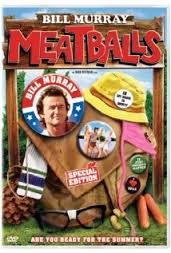
MEATBALLS
US, 1979, 99 minutes, Colour.
Bill Murray.
Directed by Ivan Reitman.
A pleasant Canadian comedy. It takes the northern hemisphere phenomenon of the Summer Camp and shows us a cross-section of ordinary kids and ordinary supervisors at such a camp. It contrasts with the ethos of the wealthy elitist camp. In its brief space of time it shows most of the conventions and the events over the summer - from good comradeship, sports, competitions. There are some enjoyable character sketches of the supervisors and some humorous sequences. A Canadian production, the film is very good humoured and slight.
1. How entertaining a film? For what audience was it made? Youngsters, adults?
2. The film's impact for a Canadian audience, American, international? A Canadian production? Locations, atmosphere?
3. The location photography, the world of the summer camps and the authenticity of this world? Audiences readily identifying with it?
4. The importance of the songs, the jaunty musical score, the lyrics?
5. The appeal of the summer camps? Parents and their hopes for their children, kids and their wanting to go or not wanting to go, participation, fears, competitiveness? The supervisors and the reasons for their going, friendships, relationships with the children, with one another? The activities of the summer camp?
6. Tripper as the focus of the film? The opening of the film with his waking up and his announcements? His organizing the kids for the camp? The humour of his interview with the television announcer and his pretending to be from the elitist camp and mocking it? The mocking touch in his character and behaviour? His relationship with Morty as the main organizer? His playing jokes on him yet his friendship? The clashes with Roxanne and yet his love for her? His befriending of fludy and sharing, things with him, training him, giving him the opportunity to win the marathon? His relationship with the supervisors, with the kids? The card game with Itudy, the running sequences, the various places where Morty's bed was placed, the basketball match, the dance, his sense of achievement, his love for Roxanne? A North American type? how likable?
7. Morty and the type who runs summer camps, his organization, his attitude to his supervisors, their playing tricks on him? Competitiveness? a good camp for ordinary children? The humour of his bed sailing down the river at the end?
8. The contrast of the elitist camp and the ordinary camp? The buses, the T.V. interview, the clashes on the basketball field and the device of winning by pulling down the trousers? The various sports events ? the cup race, the eating of the sausages, the seriousness of the marathon? ? Differences in manner, dress, resources? The activities at the camp ? the loud-speaker announcements, the huts, food, organization? The type of children at summer camps ? the scenes with the parents sending them off? Audy embodying the type that was sent away unwanted? Loneliness and yet the possibility of making friends?
9. The group of supervisors and the cross-section of boys and girls? Their managing the kids, romantic friendships, their boasts? The scene with the boats, huts, removing Morty's bed, Larry and the spying on the girls, the playing of basketball, the trek and the night out, the dance, the competitions? The happy ending and the singing?
10. The picture of Audy as the precocious type, lonely, achieving and the joy of the marathon?
11. How telling was the observation of children and adults?
12. How well did the film communicate the feel of its characters and the summer camps, the North American atmosphere? Humour, problems, sentiment?
Published in Movie Reviews
Published in
Movie Reviews
Tagged under
Saturday, 18 September 2021 19:27
Mean Streets
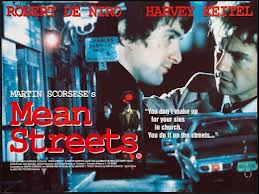
MEAN STREETS
US, 1973, 110 minutes, Colour.
Harvey Keitel, Robert de Niro, David Proval, Richard Romanus, Amy Robinson.
Directed by Martin Scorsese.
Mean Streets is an early film by Martin Scorsese. Scorsese became famous with Taxi Driver and Alice Doesn't Live Here Anymore and it is fair to look at some of his earlier work in retrospect. This film is most reminiscent of Taxi Driver, the same squalid New York streets, although this time in Scorsese's familiar ground of Little Italy. Much is made also of the Catholic upbringing and conscience faced with an environment of violence, corruption and exploitation. Harvey Keitel and Robert de Niro (pre-Taxi Driver) are two of the young men spawned by this world to scrounge and survive on the mean streets. Unrelenting in its presentation, and hard work to watch and appreciate, this is one of the most effectively grim pictures of the ugly side of New York.
1. The overall impact of the film? Plot, atmosphere, characters, themes? The immersion of the audience in the man streets?
2. The film in the perspective of the complete works of Martin Scorsese? His interests, background, themes? The autobiographical nature of the film? Reflection, condemnation, exorcism? Was there any affection for this way of life in New York?
3. The technical contribution: editing, tracking sequences? The importance of the lighting, colour, emphasis of tones especially red and black? The importance of close-ups and profiles? Improvisation? The significance and symbolism of the home movie behind the credits?
4. The contribution of the musical score? The continuous music and the selection of songs and themes? Contemporary music, disco and nightclub music contrasting with Italian songs and hymns?
5. The contribution of the acting - casting, interpretation of roles, improvisation (and the recording of the dialogue and natural sounds)? The discussion sequences, the fighting and the brawling? How authentic? The imagination behind the acting?
6. The film's purpose: observation, understanding, sympathy, empathy, exorcism? For an American audience, for non-Americans? For a non-New York audience?
7. The significance of the Italian background, the use of the Italian language and subtitles? The Italians in New York and their heritage, making this part of New York their home? The overtones of Catholicism and its pervading attitudes and beliefs - even when these were rejected verbally? Customs? The importance of the religious language. theological concepts, stern spirituality? The dominance of the Italian male and the macho attitudes? The traditions of the Mafia and the hold of the family, the disorder of breaking the appearances of family loyalty? The pervading of Italian attitudes of the characters and their situations, their rebellion?
8. The focus on the four men and the introduction to them - their symbolic action highlighting their personality and character? How well did the film portray them as persons, as types, as symbols? Symbolising attitudes? The film's focus on their interaction and making the plot out of this? How well did the audience get to know them, sympathise with them, feel and understand?
9. The contribution of the plot? the drifting of the four men through their mean streets, the development of their characters in action, in their work, in their relationships? Seeing them in the nights of the man streets? The plot thread about Johnny Boy owing Michael money and Charlie's wanting to save him? The final presentation of the main characters at the end and the Italian comment and the buona notte, goodnight?
10. Charlie as the central character: Harvey Keitel's appearance, interpretation? His waking, looking at the man streets, his room? Prospects? His way of talking, talking to himself and to the audience? Prayer, the visit to the church, the discussion about sin, guilt. repentance and forgiveness, penance and his holding his finger over the candle? Memories of Hell? The restaurant scenes, the dancing with the black go-go dancer? The drifting way of life through the bars, his preoccupation with sex and the religious background to this? The encounter with Oscar, with his uncle and his hopes for the restaurant ? Friendship with Johnny Boy and trying to protect him? Irritated with him yet continually going out of his way to help? Tony and his restaurant, Michael and his demanding money? His relationship with Theresa, the scenes in the apartment, the emphasis on sexuality, their communication? The motivation behind what he did. his kindly attitudes towards people? The argument scenes.. the fights and the brawls? The trying to help Johnny Boy with his shooting? The encounter with Theresa and her fit? The final ride and the violence suffered?
11. The contrast with Johnny Boy and his exploding the mail box. his way of talking, strutting? Shooting at the Empire State Building? The man about town. arguing, betting the money and his long descriptions of his use of money? The efforts to evade Michael? The final confrontation? The drive and the shooting?
12. Michael and his having emerged with some kind of authority from this atmosphere? On his way to becoming a Mafia hood? The irony of the false deal with the Japanese parts? A man of anger, well dressed, spoken, the spiv around town, visiting his friends, the capacity for violence? The chase and his authorising of the shooting and his watching it?
13. Tony and his throwing out the drug addict at the beginning, his restaurant, the lion in the cage downstairs as a symbol of himself? His friendliness. his life within the restaurant walls?
14. The portrait of Theresa and her relationship to Johnny Boy, her love for Charlie, the sexual relationship, the arguments? The importance of the sequence at the beach and its letting in air and light? Her liking of the beach and the water. Charlie's reaction against it? Her reaction to Michael after the shopping? Her wanting to be at the ride and her being a victim of the shooting?
15. The older generation? the uncle and his influence, Oscar and his inability to cope? The Mafia background, obligations? The assassin in the restaurant and his being sent to Miami - to be eliminated? The authorising of executions and violence? The religious background? The final look ? especially at the uncle watching the television counterpointing the shooting?
16. The importance of the presentation of violence, verbal, brawling, fist fights, the final bullets? The irony of the fountain of water flowing over the blood bespattered victims?
17. The language used - swearing, foul-mouthed? As part of the atmosphere? Symbolic of the dead-end routines and seemingly pointless existence?
18. Religious themes of sin, forgiveness, guilt and responsibility? Discussions of Hell and the symbolic visual equivalents in lurid and dark colours? The pervasiveness of Italian religion, the festival and its lights. processions, crowds? The religious icons and statues and their symbolism?
19. The tone of the ending? The audience watching each of the characters? what future? Would the fountain of water reach or touch or purify any of them?
Published in Movie Reviews
Published in
Movie Reviews
Tagged under
Saturday, 18 September 2021 19:27
Mean Season, The
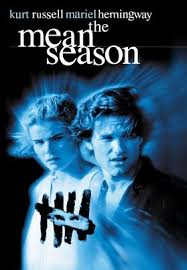
THE MEAN SEASON
US, 1985, 103 minutes, Colour.
Kurt Russell, Mariel Hemingway, Richard Jordan, Richard Masur, Richard Bradford, Joe Pantoliano, Andy Garcia.
Directed by Philip Borsos.
The Mean Season is a time of storms in Miami, Florida. It is the title of an effective murder thriller, a focus on a serial thriller who uses a journalist as a means of self-publicity and communication.
Kurt Russell is persuasive, almost as menacing as the killer. The supporting cast includes Mariel Hemingway as Russell's girlfriend, Richard Masur as his editor.
The film shows work in a newspaper office, the police and the journalist tracking down the clues of the murders, the crisis for the journalist is he begins to identify with the killer, the killer making sure that the journalist and out of the limelight. There is quite an exciting conclusion to the film. Direction is by Philip Borsos (The Grey Fox, One Magic Christmas).
1. Enjoyable thriller? Murder mystery? Journalist's film? Police work?
2. Florida and Miami settings, the visual impact of the seasons? The environment, the Everglades? The editing and pace and the climax? Atmospheric score?
3. The title, the weather, the season for murder and the dramatic use of the weather? the weather and the climax?
4. Malcolm Anderson and his reputation, his return home, resolution to resign? Relationship with Christine, Colorado? Going to the newspaper office first, before seeing Christine? The news, on the go, the story, sent by the editor, the mother and her grief, the photographer, staying with the mother, suppressing the photo? His feelings, the write-up, his becoming involved?
5. The editor, the pressures, praising Malcolm's talent for investigation, that this was what he did well, possibilities of Pulitzer Prize? Malcolm's response that he was tired of having his name beside photos of corpses?
6. The police, wary of Malcolm, clashes, Wilson and Ray, collaboration? Giving of information, sharing, involvement? Their characters, their work? Interviews? Ray's supporting Malcolm with the phone calls? The confrontation at the end?
7. Christine and her teaching, resignation, love for Malcolm, wary about his work, arguments about the killer, the Peal and their clash, the ride home, at home, the phone calls, her horror at Malcolm identifying with the killer, her answering him passionately, Malcolm angry because of the door left open? The threat to Christine, her being taken, her. fear out in the Everglades with the killer, his letting her go, the final confrontation?
8. The character of Malcolm, journalist, as a man, his reputation and skills? Love for Christine? Excitement by the work? The phone calls, the psyche of the killer, the information, the bond between the two, writing the articles, the headlines, national television, the press reaction? The proof of the first murder? The announcing of the consequent murders? Malcolm horrified but still listening? Angry with Christine? His relationship with the killer, identification but disgust? The waiting, the visit and his being deceived by the killer, searching the caravan? Admitting the hoax? The reconciliation with Christine, fears for her? The killer and the taking of the limelight, the information from the man from Chicago, putting a name to him, the apartment, the tape for Malcolm? The taking of Christine, Malcolm driving and running, the confrontation in the Everglades? The quiet finale at home, Allen's arrival, Malcolm as scared, shooting? Writing the final article with Christine and the Colorado address? Would they stay there?
9. Allen, a voice, the murders, his detachment, psyche, wanting fame? The psychologist and their observations, noting Malcolm doing well in speaking with him? The violence and the cruelty? The newspapers, the limelight? Using Malcolm, personalising, identifying? Jealousy of Malcolm, watching the television? His disguising himself and leading Malcolm on with the interview? The build-up to the final murders, the announcement about Christine, at the school, taking her, in the Everglades, the final phone call, the tape for Malcolm, the chase? The dead body? The irony of his fifth murder, coming into Christine's flat, the confrontation, his confidence, death? Portrait of a serial killer? Madness?
10. The ugliness of the killings, the pathos of the victims, the baby? The police, the role of the press? The mediator? The murderer's demands?
11. The happy ending? and how long in Colorado?
Published in Movie Reviews
Published in
Movie Reviews
Tagged under
Saturday, 18 September 2021 19:27
Midnight Dancers / Sibak
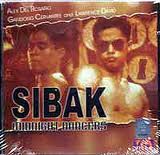
MIDNIGHT DANCERS (SIBAK)
Philippines, 1994, 128 minutes, Colour.
Directed by Mel Chionglo.
Mel Chionglo is one of a number of Filipino directors who focused in his films on themes of macho dancers, young men who danced in gay clubs and also acted as male prostitutes. His films include Burlesk King (1999) and Twilight Dancers (2006).
The setting is the poverty in Manila and in other Filipino towns, the parents with large families dependent on the incomes from the sons. Three brothers work in a gay bar and the youngest about to do the same. They want to protect him. Some of the brothers are married with family but see their work at the bar and with the men as part of their work. One of the dreams of many of these Filipinos and their girlfriends is to escape from the Philippines and get profitable jobs in Japan.
The film focuses a great deal on the performances (sometimes rather explicit) and the training of the macho dancers in the club as well as their liaisons. It also focuses on the manager of the club and the clientele. At the same time, this is balanced by a portrait of the difficulties in urban life in the country.
1. A Philippine production for the Philippines audience? For international audiences? Raising issues of sexuality and poverty and exploitation in the Philippines?
2. The local settings, the slums, the houses, the clubs, the police precincts? The focus on Philippine prostitution, the sex clubs, the dancers, the macho dancers and their clients? Moral comment on these situations and characters or not?
3. The opening with Sonny, with his client? The audience immediately plunged into the world of prostitution? The contrast then with his coming to his family, his age and experience, his relationship with his mother and father, with his older brothers?
4. The fact that the older brothers were macho dancers and prostitutes, Sonny going to the bar, the boss, the transvestite, his being ignorant, his being fascinated by the dancers, the customers? Audience response to the dancers themselves, to the customers and their response? The attitude of Sonny's mother to the situation, the poverty and her accepting of it? His father's disdain?
5. The world of city prostitution, the streets, the fights, seeing the men with their clients, the dancing, the tricks?
6. The street gangs and their violence in the city? Stealing cars, fighting?
7. The older brothers and their names at the club, their dancing? The married brother and his children? His relationship with the client? Morality and money?
8. The men at the club, the two brothers, their relationship with the boss? The drug-taking, the collapse? The police raids?
9. Michelle, the friendship with Sonny? The discussions about going to Japan to earn more money and a better life?
10. The ordinary life of the young men outside the club, seemingly normal, family, friendships? The possibility of buying another house?
11. Bogart and his coming into the household, his being accepted? As a thief, causing violence?
12. The scene at home, the father moving out, the mother pursuing him, the fight with the mistress? The attitudes of the sons?
13. The raids, the police and their action? The boss getting the men out of prison? The continued life at the club, the men on display for the clients?
14. The build-up to the drug deals, the shootouts, the gangsters, the street gangs, Dennis being killed? The finding of the body, the funeral, the photo, his mother? The speech about retribution?
15. The question of the future, the police, the young woman going to Japan?
16. The shootings and the boys on the run, the mother bashed? The final moralising, Sonny and his other clients, trying to build up the money? He and his brother having to escape, the final crouching and watching the macho dancing?
17. The film as an insight into aspects of life in the Philippines? The Catholic country and its religious traditions, the morality and amorality of the sex industry, the tolerance of families in their children earning money, the hopes to get away from the Philippines, even if simply to more advantageous prostitution? The corruption of the police? The absence of support from government or the church?
Published in Movie Reviews
Published in
Movie Reviews
Tagged under
Saturday, 18 September 2021 19:27
Band Wagon, The
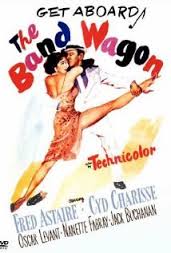
THE BAND WAGON
US, 1953, 111 minutes, Colour.
Fred Astaire, Cyd Charisse, Oscar Levant, Nanette Fabray, Jack Buchanan.
Directed by Vincente Minnelli.
The Band Wagon is considered one of the best musicals of all time. It is yet another fine film for Fred Astaire who had begun in musicals twenty years earlier, with cautions from the studio heads who felt that he could dance a little. From the 1930s and his partnership with Ginger Rogers he moved into the 1940s and a range of musicals and leading ladies including Betty Hutton and Vera Ellen. He is at his peak dancing with Cyd Charisse – who had also made an impact during the 1940s and 1950s in such films as Singin’ in the Rain and Brigadoon. Musician Oscar Levant also features. British song-and-dance man Jack Buchanan has a central role.
The film is a satire on show business. The idea is to put on a small Broadway show – but a modernistic artistic director is brought in who pretentiously changes the style of the film. However, the variation on ‘Let’s put on a show’ is very entertaining. One of the featured songs is the classic ‘That’s Entertainment’.
Vincente Minnelli had directed a number of very successful musicals from the 1940s including Meet Me In St Louis with his then wife Judy Garland. During the 1950s he moved into strong melodramas including The Bad and the Beautiful and the biography of Van Gogh, Lust for Life. He was to win an Oscar for his direction of Gigi in 1958.
The screenplay is by veterans Betty Comden and Adolph Green (Good News, The Barkleys of Broadway, On the Town, Singin’ in the Rain). The film was entered on the National Registry of Films in the US in 1995.
1. How good a musical is this? It is considered a classic. Does it deserve it? What conventions were to the fore, song, dance, comedy, characterizations, the theatre world, stage performances and choreography? How well were each used?
2. How important was the presence of Fred Astaire in this film? The mystique about his dancing? His quality of dancing? His flair for musical comedy? The values implicit in his characterization as getting older, fading, lack of success and the comparisons with his own life?
3. How was the theme, 'That's Entertainment' important for the film? The implications of the lyrics of the song? Its appearance during the film and as a finale? Did the film entertain audiences? What is entertainment and how is it illustrated in this film?
4. How important was the theatre background? The atmosphere of theatre and its life, theatre as a means of communication, for exploring values, but as being too serious, for laughter, songs, spectacle?
5. How well did the film show the world of actors? Personalities and temperaments, clashes and ambitions, careers, agents, and manipulation, fights? Tony as a man of the theatre and his fears, clashes with Gaby, gradual reconciliations, determination to go on and succeed? Gaby as a ballerina, managed by Paul, fearful of Tony, getting into the swing of the musical comedy, falling in love with Tony etc.?
6. The comedy in the presentation of the Martons? The clashes of husband and wife in their creativity? Their participation in plot and in the musical, 'The Bandwagon'?
7. The importance of the character of Cordova? The vain character? playing Oedipus, the satire in him as actor and director, entrepreneur? His belief in the Faust legend and the dramatic build-up, his failure? His response to the failure and his joining in the musical? Jack Buchanan's capacity for song and dance?
8. Was plot important for this film? Was it original, did it have cliches?
9. The importance of the songs in the film? Fred Astaire's initial biographical song? 'That's Entertainment'? The comic songs?
10. The impact of the dancing in the film? Cyd Charisse as a suitable Astaire partner? The importance and tone of 'Dancing In The Dark'? The Mickey Spillane ballet? Fred Astaire's elegant dancing with Jack Buchanan?
11. How important was the dialogue of this film? The sharpness of the quips? Style?
12. Is it easy to see why this film is considered a classic?
Published in Movie Reviews
Published in
Movie Reviews
Tagged under
Saturday, 18 September 2021 19:27
Battle Cry
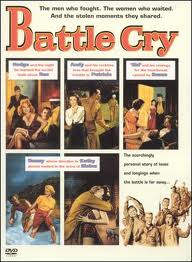
BATTLE CRY
US, 1955, 149 minutes, Colour.
Van Heflin, Aldo Ray, Mona Freeman, Nancy Olson, James Whitmore, Raymond Massey, Tab Hunter, Dorothy Malone, Anne Francis, William Campbell, L.Q. Jones, Fess Parker.
Directed by Raoul Walsh.
Battle Cry was a big-budget Warner Bros film of the mid-50s, made for the wide screen, one of those films made to entice audiences away from their television sets.
The film was based on a novel by Leon Uris (Exodus) who wrote the screenplay for the film.
Many of the players worked at Warner Bros during the 1950s and were some lead actors (Aldo Ray, Tab Hunters, Van Heflin) as well as character actors including Raymond Massey and James Whitmore. The cast of actresses is not the A list but a group of competent actresses who again appeared in many films of this period.
The film was directed by Raoul Walsh who had been directing films from 1913. He made many action films during the 1930s, especially for James Cagney and Humphrey Bogart. He continued to make a number of war films during the 1940s including three for Errol Flynn to win the war (Northern Pursuit, Uncertain Glory, Objective Burma). He made such classics as White Heat. During the 1950s he made a number of smaller, more action-oriented films.
1. An enjoyable film? The emphasis on length, scope, large canvas? The soap opera romance film? The war film?
2. The use of Cinemascope, colour, locations, big stars of the 1950s? The impact now?
3. Comment on the film as a war film of the mid-fifties. The perspective it presented of the 1940s and the war years? how are the attitudes of the 1940s and the 1950s seen by later decades? Is the film still fresh? does it seem dated?
4 The significance of the title, its implications, its indication of the themes of the film? A straightforward title or ironic?
5. Comment on the success of the structure and its Impact: the episodic nature, the links of the relationships between men and women, the themes of relationships and war, the question of war and morale, as a picture of Americans during the war at home and abroad, America's role in the war of the Pacific?
6. The film's insight into men and women and their relationships? The nature of love and its substitutes? The insight into American character and temperament, their impact on outsiders, for example New Zealanders? The insight into men and women in war situations? The nature of changes? The nature of fear? Injury and death?
7. Did the film remain on a superficial level, was there any depth in their exploration?
8. The portrait of Huxley: as central to the linking of the film's themes and episodes? Huxley as the military man, dedicated to a job, the nature of his toughness, softness? The need for making decisions, for boosting morale? His declaration about the long walk? About Andy's wedding? The significance of his conversations with Rat? His need for fighting and for his men to fight? The confrontation with the general? The dramatic impact of his death and the impact on the men?
9. The film's emphasis on military training? The significance and impact of this, audience response to drilling and training? How did this fit in with the actual scenes of war? Were these adequate and lengthy for such a long film?
10. The exploration of Danny's character? The all American boy, pictured at home, relationship with Cathy, swearing fidelity, the harshness of training, the experience of loneliness, the attraction towards Elaine and the liaison with her, the effect on his life, the authority taking over and sending him home? The nature of his choices, the forgiveness of Cathy? How did war make him grow up? The significance of hie being wounded? Cathy's dream, his going home?
11. How did Andy contrast with Danny? The rough and ready type, the lumberjack, the man who could drink and gamble? His first confrontation with Pat, the growing relationship, her background, being a widow? Why did they fall in love? Their living together? Their marriage and their news about the baby? Pat waiting, Andy's suffering, his being confronted to come back to life? Future prospects?
12. The importance of the episode of Marion as a writer? His aloneness and aloofness? His meeting Rae on the ferry? His being disappointed in her? Her writing to him and his reconciliation? The sadness of his death?
13. Did the film give much insight into these men and their characters? Their plights? As men caught in war? The details of the minor characters among the soldiers?
14. The character of the general and Mac his confrontation with Huxley, his supporting of him? (American morale and patriotism?)
15. The importance of Mac as the chorus: the fact that he gave the narrative, his value judgements on the personnel and their characters, their situations, the war? Hie support of Huxley, his criticism of Huxley, his relationship with the men? His place at the end? As the focus of the whole film?
Published in Movie Reviews
Published in
Movie Reviews
Tagged under